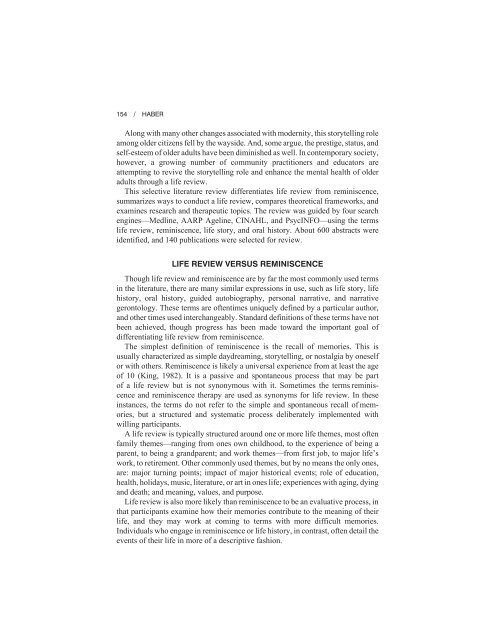life review: implementation, theory, research, and therapy - Wiki Home
life review: implementation, theory, research, and therapy - Wiki Home
life review: implementation, theory, research, and therapy - Wiki Home
You also want an ePaper? Increase the reach of your titles
YUMPU automatically turns print PDFs into web optimized ePapers that Google loves.
154 / HABER<br />
Along with many other changes associated with modernity, this storytelling role<br />
among older citizens fell by the wayside. And, some argue, the prestige, status, <strong>and</strong><br />
self-esteem of older adults have been diminished as well. In contemporary society,<br />
however, a growing number of community practitioners <strong>and</strong> educators are<br />
attempting to revive the storytelling role <strong>and</strong> enhance the mental health of older<br />
adults through a <strong>life</strong> <strong>review</strong>.<br />
This selective literature <strong>review</strong> differentiates <strong>life</strong> <strong>review</strong> from reminiscence,<br />
summarizes ways to conduct a <strong>life</strong> <strong>review</strong>, compares theoretical frameworks, <strong>and</strong><br />
examines <strong>research</strong> <strong>and</strong> therapeutic topics. The <strong>review</strong> was guided by four search<br />
engines—Medline, AARP Ageline, CINAHL, <strong>and</strong> PsycINFO—using the terms<br />
<strong>life</strong> <strong>review</strong>, reminiscence, <strong>life</strong> story, <strong>and</strong> oral history. About 600 abstracts were<br />
identified, <strong>and</strong> 140 publications were selected for <strong>review</strong>.<br />
LIFE REVIEW VERSUS REMINISCENCE<br />
Though <strong>life</strong> <strong>review</strong> <strong>and</strong> reminiscence are by far the most commonly used terms<br />
in the literature, there are many similar expressions in use, such as <strong>life</strong> story, <strong>life</strong><br />
history, oral history, guided autobiography, personal narrative, <strong>and</strong> narrative<br />
gerontology. These terms are oftentimes uniquely defined by a particular author,<br />
<strong>and</strong> other times used interchangeably. St<strong>and</strong>ard definitions of these terms have not<br />
been achieved, though progress has been made toward the important goal of<br />
differentiating <strong>life</strong> <strong>review</strong> from reminiscence.<br />
The simplest definition of reminiscence is the recall of memories. This is<br />
usually characterized as simple daydreaming, storytelling, or nostalgia by oneself<br />
or with others. Reminiscence is likely a universal experience from at least the age<br />
of 10 (King, 1982). It is a passive <strong>and</strong> spontaneous process that may be part<br />
of a <strong>life</strong> <strong>review</strong> but is not synonymous with it. Sometimes the terms reminiscence<br />
<strong>and</strong> reminiscence <strong>therapy</strong> are used as synonyms for <strong>life</strong> <strong>review</strong>. In these<br />
instances, the terms do not refer to the simple <strong>and</strong> spontaneous recall of memories,<br />
but a structured <strong>and</strong> systematic process deliberately implemented with<br />
willing participants.<br />
A <strong>life</strong> <strong>review</strong> is typically structured around one or more <strong>life</strong> themes, most often<br />
family themes—ranging from ones own childhood, to the experience of being a<br />
parent, to being a gr<strong>and</strong>parent; <strong>and</strong> work themes—from first job, to major <strong>life</strong>’s<br />
work, to retirement. Other commonly used themes, but by no means the only ones,<br />
are: major turning points; impact of major historical events; role of education,<br />
health, holidays, music, literature, or art in ones <strong>life</strong>; experiences with aging, dying<br />
<strong>and</strong> death; <strong>and</strong> meaning, values, <strong>and</strong> purpose.<br />
Life <strong>review</strong> is also more likely than reminiscence to be an evaluative process, in<br />
that participants examine how their memories contribute to the meaning of their<br />
<strong>life</strong>, <strong>and</strong> they may work at coming to terms with more difficult memories.<br />
Individuals who engage in reminiscence or <strong>life</strong> history, in contrast, often detail the<br />
events of their <strong>life</strong> in more of a descriptive fashion.


